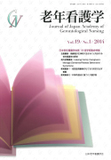Japanese
English
- 販売していません
- Abstract 文献概要
- 参考文献 Reference
抄録
本研究の目的は,関節リウマチをもつ高齢者(以下,RA高齢者)の「老年期のライフイベント」への適応にみられた「能力」から,ストレングスの構造化を図ることである.
RA高齢者14人に対し面接調査を行い,質的記述的に分析した.その結果,97のキーセンテンス,26のサブカテゴリー,13のカテゴリー【長患いの価値】【自己覚知】【しなやかさ】【謝恩】【根気】【跳ね返す力】【自己決定力】【言語化による自己表現】【臨機応変にセルフケア】【居心地よさの創出】【社会資源の獲得】【世話上手】【次世代の育成】が抽出された.さらに,カテゴリーは,3つのコアカテゴリー《病気の意味の探求》《受容》《相互依存》として抽出された.以上のことから,RA高齢者のストレングスの一構成要素としての「能力」の構造は,病気の意味を探求し受容して,環境と相互依存できる構造であることが示唆された.
The purpose of this study was to identify the structure of strengths in elderly individuals with rheumatoid arthritis (RA) that serve as competencies for adapting to life events in old age. Interviews were conducted with 14 elderly individuals with RA. Qualitative descriptive analysis of the data extracted 97 key sentences, 26 subcategories and 13 categories, as competencies that elderly individuals with RA use to manage events in their daily lives. These 13 categories were — value of long-term disease, self-awareness, flexibility, gratitude, perseverance, ability to recover, self-determination, verbalized self-expression, improvised self-care, creation of comfort, acquisition of social resources, care giving skills, and nurturing future generations. Moreover, 3 core-categories, pursuing meaning of illness, acceptance, and interdependency were extracted. Structure of competencies, as one of the elements of strengths of elderly individuals with rheumatoid arthritis, are pursuing and accepting the meaning of illness, and interdependence with surroundings.
Copyright © 2014, Japan Academy of Gerontological Nursing All rights reserved.


